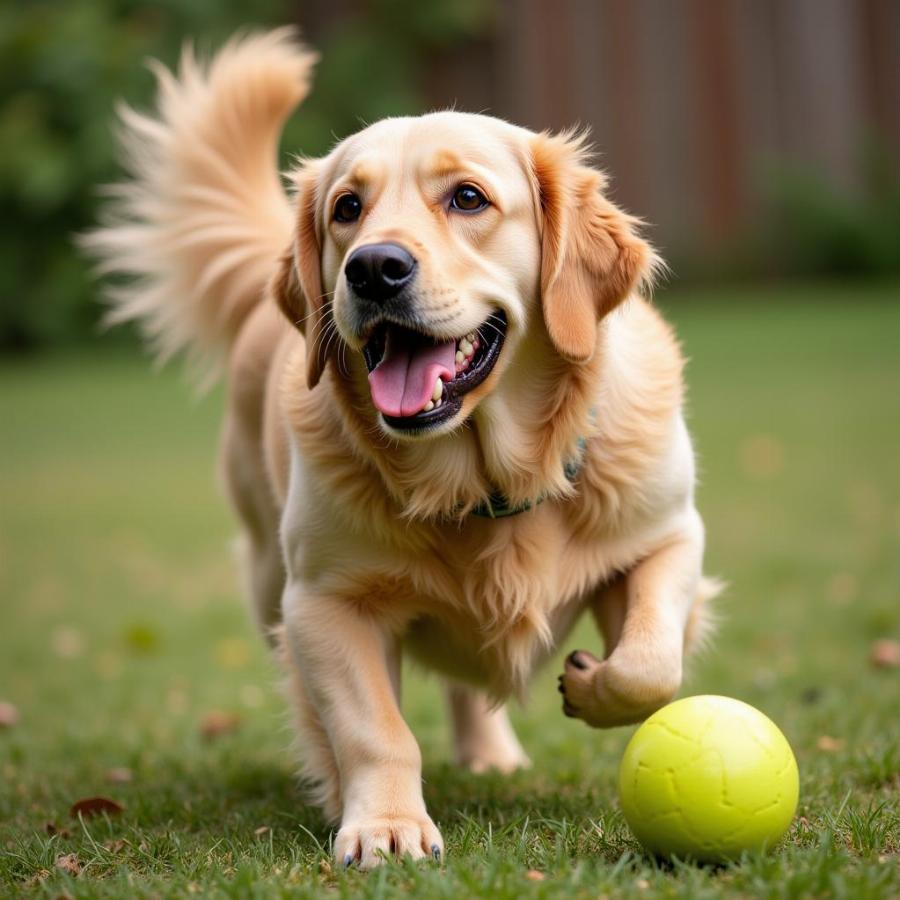Seeing your dog with a foamy mouth can be alarming. While some causes are benign, others can indicate a serious health concern. This comprehensive guide will explore the various reasons why your dog’s mouth might be foaming and help you determine when immediate veterinary attention is necessary.
Common Causes of Foaming at the Mouth in Dogs
There are several reasons why your furry friend might have foam around their mouth, ranging from completely harmless to potentially serious.
Excitement and Anticipation
One of the most common reasons for a dog’s mouth to foam is excitement, particularly when they anticipate something enjoyable, like a walk, treat, or playtime. This type of foaming is usually nothing to worry about and typically subsides as your dog calms down.
 Excited Dog Foaming at the Mouth
Excited Dog Foaming at the Mouth
Dental Issues
Dental problems, such as gum disease, tooth decay, or mouth sores, can cause excessive salivation and foaming, particularly in older dogs. If you notice persistent bad breath, red or swollen gums, or your dog pawing at their mouth, it’s crucial to schedule a check-up with your veterinarian.
Nausea and Upset Stomach
Just like humans, dogs can feel nauseous, and this can manifest as drooling and foaming at the mouth. This is often accompanied by other symptoms like lip licking, pacing, and vomiting. If your dog’s nausea persists or worsens, consult your veterinarian.
Heatstroke
Dogs regulate their body temperature differently than humans, making them susceptible to heatstroke. Excessive panting and drooling, along with thick saliva and foaming at the mouth, are warning signs of heatstroke. This is a serious condition requiring immediate veterinary care.
Poisoning
Ingestion of toxic substances, such as certain plants, medications, or household chemicals, is a dangerous cause of foaming at the mouth in dogs. If you suspect your dog has ingested something poisonous, contact your veterinarian or the ASPCA Animal Poison Control Center immediately.
Seizures
Foaming at the mouth can be a symptom of seizures in dogs. Seizures can manifest in various ways, including collapsing, stiffening, twitching, or loss of consciousness. If your dog experiences a seizure, even if it seems to resolve quickly, contact your veterinarian immediately.
When to Worry and Seek Veterinary Attention
While occasional foaming at the mouth might be normal, especially during excitement, it’s important to recognize when it warrants a trip to the veterinarian. Seek immediate veterinary care if your dog’s foaming is accompanied by any of the following:
- Difficulty breathing
- Lethargy or weakness
- Loss of appetite
- Vomiting or diarrhea
- Seizures or tremors
- Disorientation or confusion
- Pale gums
Preventing Foaming at the Mouth in Dogs
While not all causes of foaming are preventable, here are some steps you can take to minimize the risk:
- Practice good dental hygiene: Brush your dog’s teeth regularly, provide dental chews, and schedule annual dental cleanings with your veterinarian.
- Secure hazardous substances: Keep all medications, cleaning products, and other potentially toxic substances out of your dog’s reach.
- Be mindful of heat: Avoid strenuous activity during the hottest parts of the day and ensure your dog always has access to shade and fresh water.
- Know what’s toxic: Familiarize yourself with common household items and plants that are poisonous to dogs.
Frequently Asked Questions
Q: My dog foams at the mouth when they see their leash. Should I be worried?
A: This is likely due to excitement and anticipation. As long as the foaming subsides once your dog calms down, there’s usually no need for concern.
Q: My dog has started foaming at the mouth and seems lethargic. What should I do?
A: Lethargy along with foaming can be a sign of a more serious issue. It’s crucial to contact your veterinarian immediately.
Q: Can certain dog foods cause foaming at the mouth?
A: Food allergies or sensitivities can cause a range of symptoms, including excessive drooling. If you suspect your dog might have a food allergy, consult your veterinarian.
Q: My dog has bad breath and foams at the mouth sometimes. Could it be their teeth?
A: Bad breath and foaming can indicate dental problems. Schedule a check-up with your veterinarian for a thorough examination.
Q: My dog ate some chocolate. Could that be why they are foaming at the mouth?
A: Chocolate is toxic to dogs. Contact your veterinarian or the ASPCA Animal Poison Control Center immediately.
Looking for More Information?
Check out these other helpful articles on Beaut Dogs:
Beaut Dogs is your go-to source for all things related to dog care! We provide reliable information to help you understand your furry friend better. For any concerns, reach out to us at [email protected] for detailed guidance.